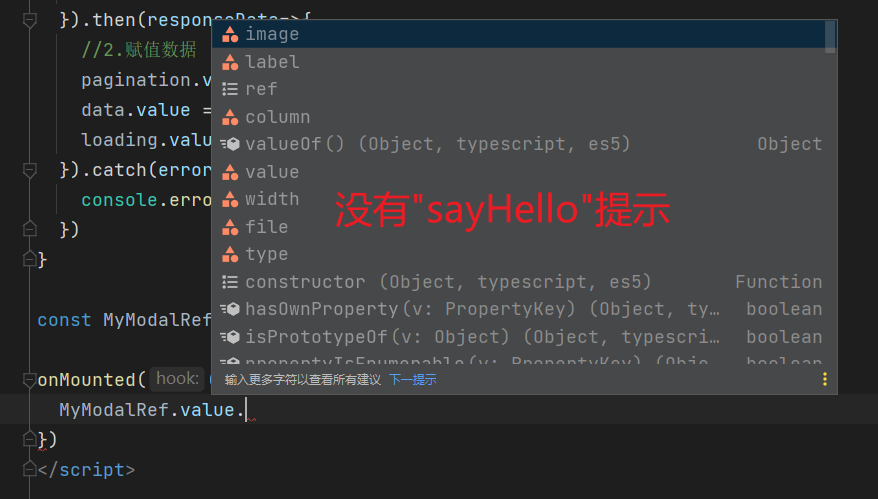vue3取得ref實例結合ts的InstanceType問題怎麼解決
- WBOYWBOYWBOYWBOYWBOYWBOYWBOYWBOYWBOYWBOYWBOYWBOYWB轉載
- 2023-05-20 22:59:321993瀏覽
vue3取得ref實例結合ts的InstanceType
有時候我們範本引用,但是在使用的時候,ts提示卻不行,沒有提示元件透過defineExpose暴露的方法名稱,雖然這不是很影響,但是可以解決還是可以解決下~
<!-- MyModal.vue -->
<script setup lang="ts">
import { ref } from 'vue'
const sayHello = () => (console.log('我会说hello'))
defineExpose({
sayHello
})
</script>然後我們在父級使用,輸入完成MyModalRef.value會發現沒有sayHello這個函數提示,所以這個時候我們就需要使用InstanceType 工具類型來取得其實例類型
<!-- App.vue -->
<script setup lang="ts">
import MyModal from './MyModal.vue'
const MyModalRef = ref()
const handleOperation = () => {
MyModalRef.value.sayHello
}
</script>
#使用InstanceType 工具類型來取得其實例類型:
<!-- MyModal.vue -->
<script setup lang="ts">
import { ref } from 'vue'
const sayHello = () => (console.log('我会说hello'))
defineExpose({
open
})
</script>父級使用
<!-- App.vue -->
<script setup lang="ts">
import MyModal from './MyModal.vue'
const MyModalRef = ref<InstanceType<typeof MyModal> | null>(null)
const handleOperation = () => {
MyModalRef.value?.sayHello()
}
</script>貌似依舊沒有提示使用InstanceType在提示的時候,然後輸入錯誤內容也沒有在編譯前進行報錯…,不過vue官方這樣子說了,那就聽他的吧(其實我一般不用,不過也學到了)
@vue官方API為組件模板引用標註類型
如何為vue3組件標註TS類型
Vue3和TS絕對是在今年最受歡迎的前端技術之列。許多公司正在使用 Vue3 TS Vite 組合來開發新專案。以下是重寫的句子:分享在Vue3元件中如何使用Composition-Api結合TS類型。
為props 標註類型
使用
當使用
<script setup lang="ts">
const props = defineProps({
foo: { type: String, required: true },
bar: Number
})
props.foo // string
props.bar // number / undefined
</script>這稱為運行時聲明,因為傳遞給defineProps() 的參數會作為運行時的props 選項使用。
第二種方式,透過泛型參數來定義props 的類型,這種方式更直接:
<script setup lang="ts">
const props = defineProps<{
foo: string
bar?: number
}>()
</script>
/* or
<sctipt setup lang="ts">
interface Props {
foo: string
bar?: number
}
const props = defineProps<Props>()
</script>
*/編譯器會嘗試推導類型參數並產生對應的執行時間選項,這種方法被稱為基於類型的聲明。這種方法的缺點在於無法定義props預設值的能力已經喪失。使用 withDefaults 編譯器可以解決這個問題
interface Props {
msg?: string
labels?: string[]
}
const props = withDefaults(defineProps<Props>(), {
msg: 'hello',
label: () => ['one', 'two']
})上面程式碼會被編譯為等價的執行時間 props 的 default 選項。
非
如果沒有使用
import { defineComponent } from 'vue'
export default defineComponent({
props: {
message: String
},
setup(props){
props.message // 类型:string
}
})為emits 標註類型
使用
在
<script setup lang="ts">
// 运行时
const emit = defineEmits(['change', 'update'])
//基于类型
const emit = defineEmits<{
(e: 'change', id: number): void
(e: 'update', value: string): void
}>()
</script>我們可以看到,基於類型聲明可以使我們對所觸發事件的類型進行更細粒度的控制。
非
若沒有使用
import { defineComponent } from 'vue'
export default definComponent({
emits: ['change'],
setup(props, { emit }) {
emit('change') //类型检查 / 自动补全
}
})為ref() 標註類型
預設推導類型
#ref 會根據初始化時的值自動推導其類型:
import { ref } from 'vue'
// 推导出的类型:Ref<number>
const year = ref(2022)
// TS Error: Type 'string' is not assignable to type 'number'.
year.value = '2022'透過介面指定類型
有時我們可能想要為ref 內的值指定一個更複雜的類型,可以透過使用Ref 這個介面:
import { ref } from 'vue'
import type { Ref } from 'vue'
const year: Ref<string | number> = ref(2022)
year.value = 2022 //成功透過泛型指定類型
#或者,在呼叫ref () 時傳入一個泛型參數,來覆寫預設的推導行為:
// 得到的类型:Ref<string | number> const year = ref<string | number>('2022') year.value = 2022 //成功
如果你指定了一個泛型參數但沒有給出初始值,那麼最後得到的就將是一個包含undefined 的聯合類型:
// 推导得到的类型:Ref<number | undefined> const n = ref<number>()
為reactive() 標註類型
預設推導類型
reactive() 也會隱含地從它的參數推導出類型:
import { reactive } from 'vue'
//推导得到的类型:{ title: string }
const book = reactive({ title: 'Vue 3 指引'})透過介面指定類型
要顯示地指定一個reactive 變數的類型,我們可以使用介面:
import { reactive } from 'vue'
interface Book {
title: string
year?: number
}
const book: Book = reactive({ title: 'Vue 3 指引' })為computed() 標註類型
#預設推導類型
computed() 會自動從其計算函數地傳回值上推導出類型:
import { ref, computed } from 'vue'
const count = ref(0)
// 推导得到的类型:ComputedRef<number>
const double = computed(() => count.value * 2)
// TS Error: Property 'split' does not exist on type 'number'
const result = double.value.split('')透過泛型指定類型
const double = component<number>(() => {
// 若返回值不是 number 类型则会报错
})為事件處理函數標註類型
在處理原生DOM事件時,應該給事件處理函數的參數正確地標註類型,如:
<script srtup lang="ts">
function handleChange(event) {
// `event` 隐式地标注为 `any`类型
console.log(event.target.value)
}
</script>
<template>
<input type="text" @change="handleChange" />
</template>當沒有型別標註時,這個event參數會自動被辨識為任意型別。這也會在 tsconfig.json 中配置了 "strict": true 或 "noImplicitAny": true 時報出一個 TS 錯誤。因此,建議明確地為事件處理函數地參數標註類型。此外,你可能需要明確地強制轉換 event 上地屬性:
function handleChange(event: Event) {
console.log((event.target as HTMLInputElement).value)
}為 provide / inject 標註類型
provide 和 inject 通常會在不同的元件中運行。要正確地為注入的值標記類型,Vue提供了一個Injectionkey 接口,它是一個繼承自Symbol 的泛型類型,可以用來在提供者和消費者之間同步注入值的類型:
import { provide, inject } from 'vue'
import type { Injectiokey } from 'vue'
const key = Symbol() as Injectionkey<string>
provide(key,'foo') // 若提供的是非字符串值会导致错误
const foo = inject(key) // foo 的类型: string | undefined建議將注入key的類型放在一個單獨的檔案中,這樣它就可以被多個元件導入。
當使用字串注入 key 時,注入值的類型是 unknown,需要透過泛型參數顯示宣告:
const foo = inject<string>('key') // 类型:string | undefined
由于提供者在运行时可能没有提供这个值,因此请注意注入的值可能仍然是未定义的。移除 undefined 类型的方法是提供一个默认值
const foo = inject<string>('foo', 'bar') // 类型:string
如果你确定该值始终被提供,则还可以强制转换该值:
const foo = inject('foo') as string
为 dom 模板引用标注类型
模板 ref 需要通过一个显式指定的泛型参数和一个初始值 null 来创建:
<script setup lang="ts">
import { ref, onMounted } from 'vue'
const el = ref<HTMLInputElement | null>(null)
onMounted(() => {
el.value?.focus()
})
</script>
<template>
<input ref="el" />
</template>为了严格的类型安全,请使用可选链或类型守卫来访问 el.value。这是因为直到组件被挂载前,这个 ref 的值都是初始的 null,并且 v-if 将引用的元素卸载时也会被设置为 null。
为组件模板引用标注类型
有时候,我们需要为一个子组件添加一个模板引用(template reference),以便可以调用它公开的方法。举个例子,我们有一个 MyModal 子组件,其中包含一个用于打开模态框的方法:
<script setup lang="ts">
import { ref } from 'vue'
const isContentShown = ref(false)
const open = () => (isContentShow.value = true)
defineExpose({
open
})
</script>为了获取 MyModal 的类型,我们首先需要通过 typeof 得到其类型,再使用 TypeScript 内置的 InstanceType 工具类型来获取其实例类型:
<script>
import MyModal from './MyModal.vue'
const modal = ref<InstanceType<typeof MyModal > | null>(null)
const openModal = () => {
modal.value?.open()
}
</script>以上是vue3取得ref實例結合ts的InstanceType問題怎麼解決的詳細內容。更多資訊請關注PHP中文網其他相關文章!

